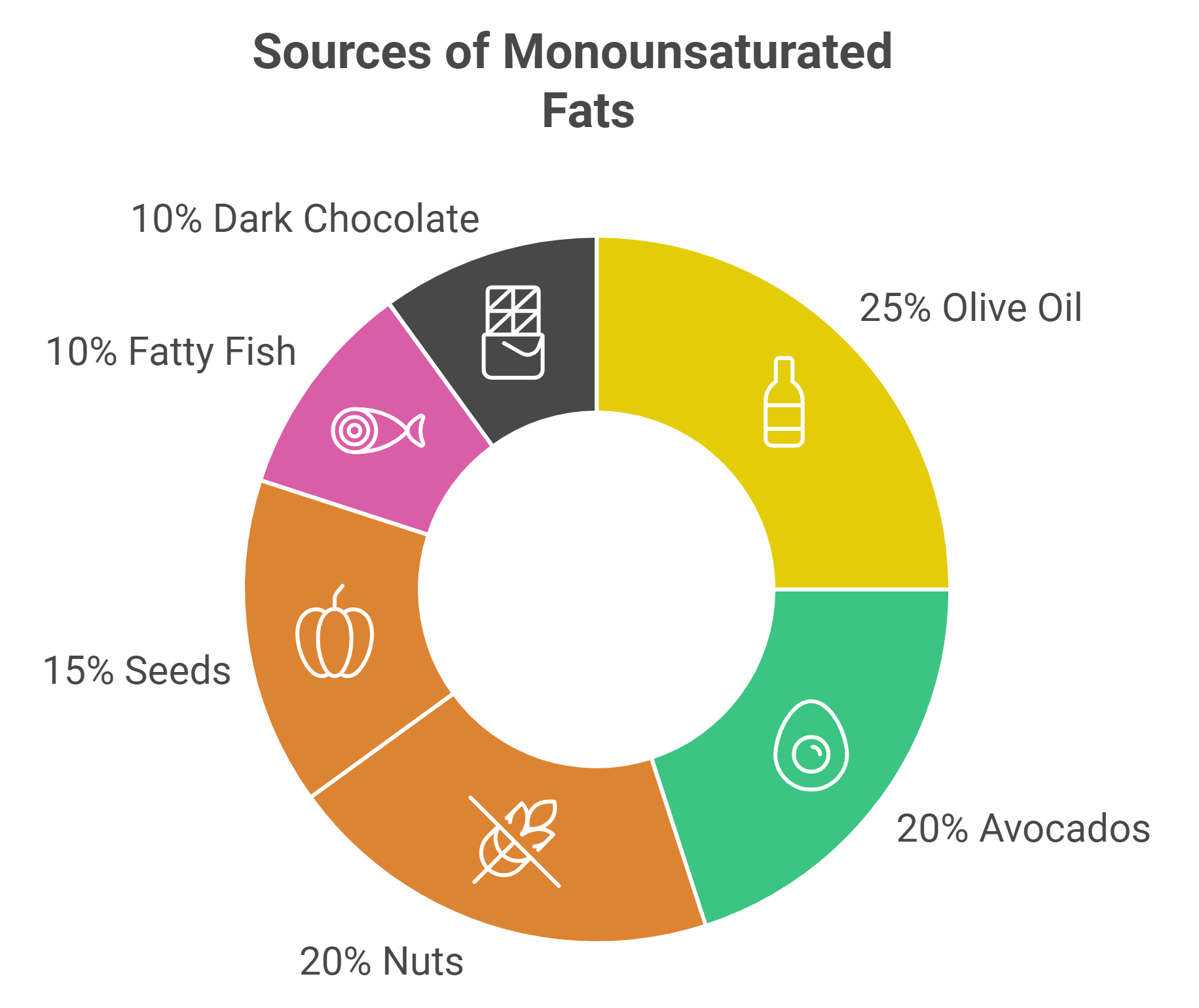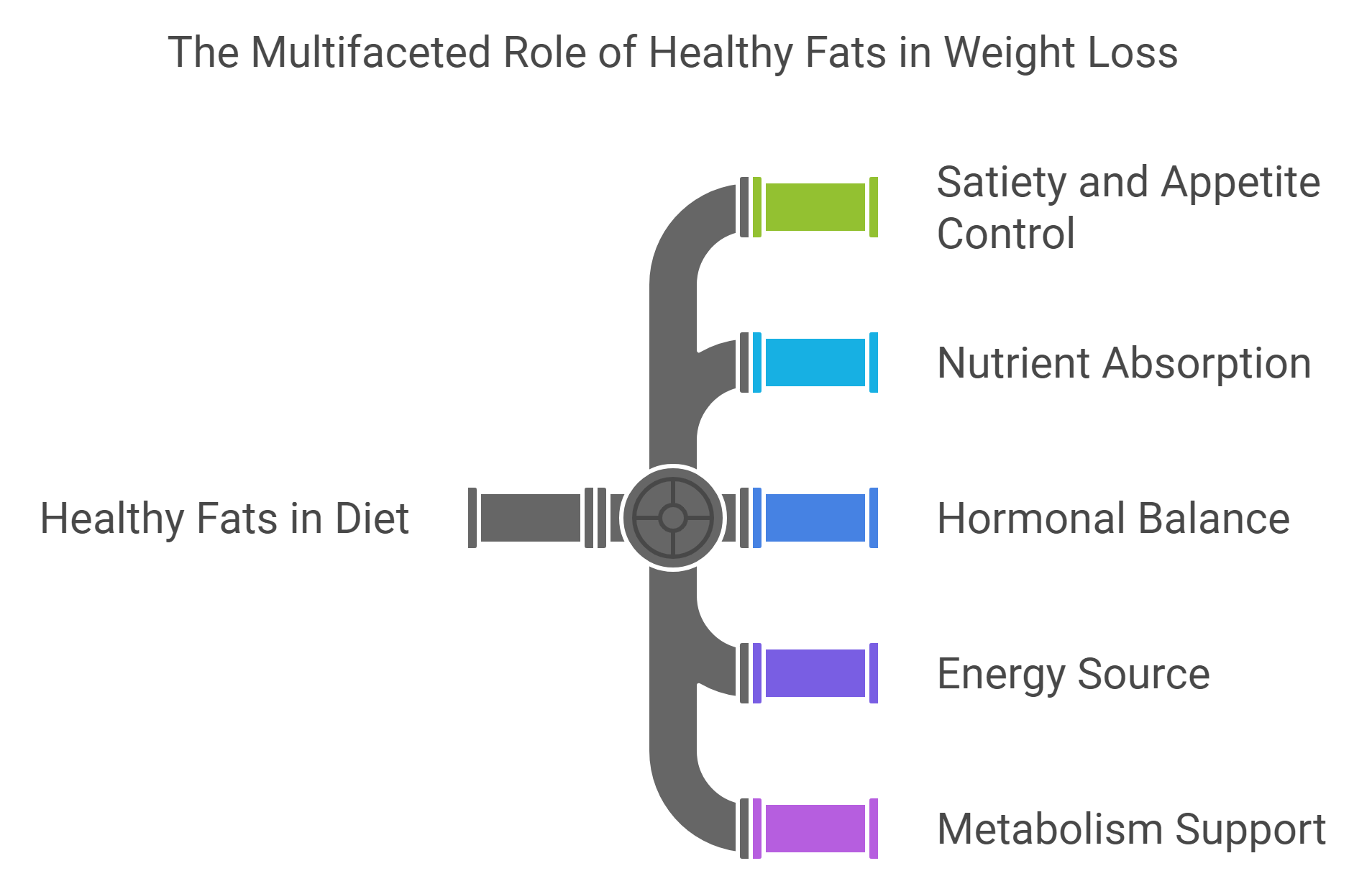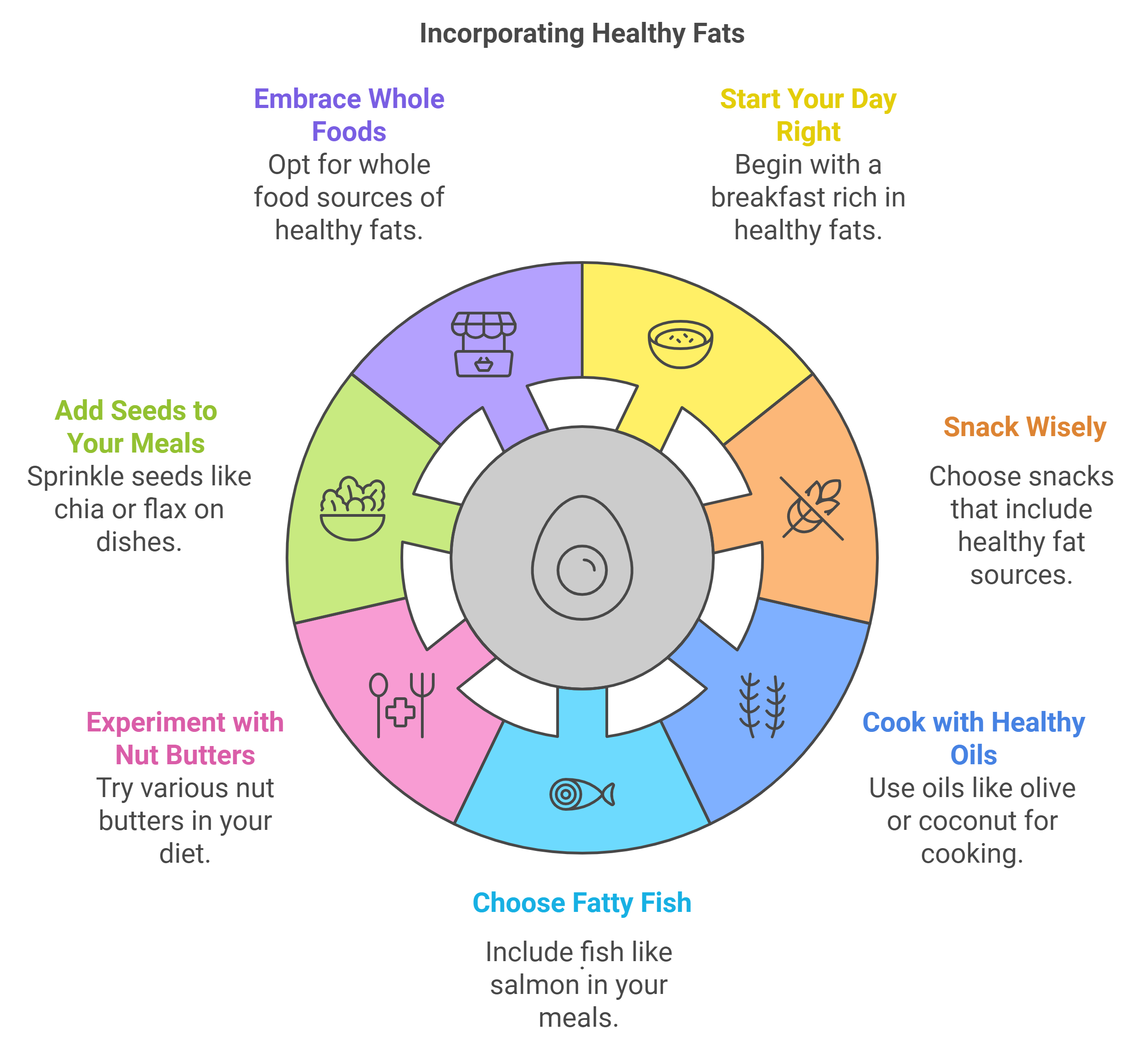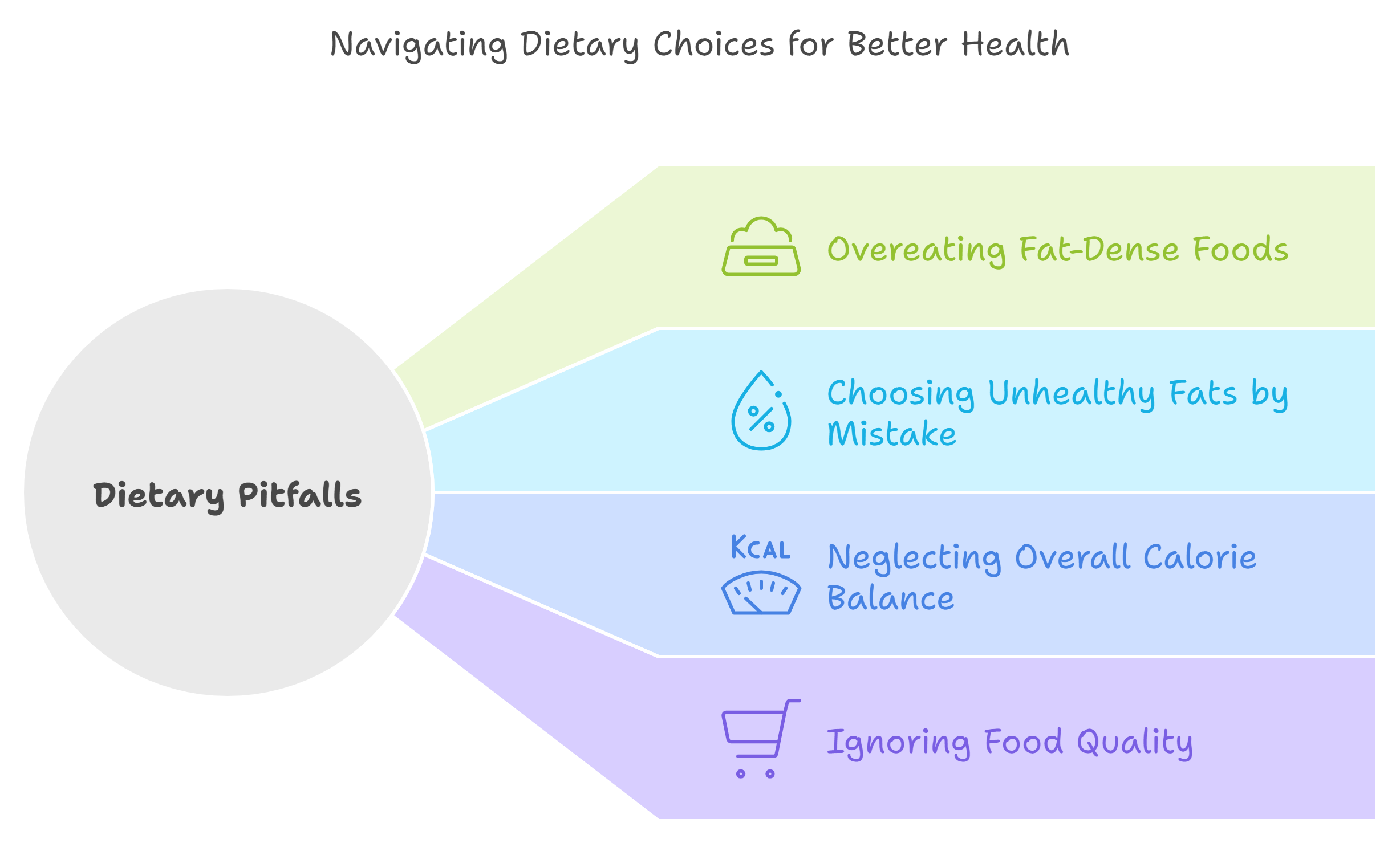1. Introduction to Healthy Fats
What Are Healthy Fats?
Healthy fats are a vital component of a balanced diet, providing the body with the essential nutrients it needs to function properly. Unlike unhealthy fats, which can increase the risk of heart disease and other health issues, healthy fats support overall well-being. They play a critical role in energy production, nutrient absorption, and even brain health. Healthy fats include unsaturated fats such as monounsaturated and polyunsaturated fats, as well as moderate amounts of saturated fats from natural sources.
In the context of weight loss, healthy fats are often misunderstood. Many people associate fat consumption with gaining weight, leading to unnecessary fear of adding fats to their meals. However, not all fats are created equal, and consuming the right types in appropriate amounts can actually support your weight loss journey.
Debunking the Myth: Fat Doesn’t Make You Fat
For decades, dietary fat was vilified as a major culprit behind weight gain. This misunderstanding was largely based on the assumption that eating fat translates directly to body fat. The truth is more nuanced. While fats are calorie-dense, healthy fats have unique properties that can aid in weight management.
Healthy fats help regulate hunger hormones, making you feel fuller for longer periods. They also provide a steady source of energy and prevent blood sugar spikes, which can lead to cravings and overeating. Furthermore, incorporating healthy fats into your diet can improve the taste and satisfaction of your meals, making it easier to stick to a nutritious eating plan.
By understanding the distinction between healthy fats and harmful fats, you can make informed choices that contribute to both weight loss and overall health. Embracing healthy fats is an important step toward achieving your wellness goals.
Affiliate Disclaimer
This blog post may include links to affiliate sites. If you click on an affiliate link and make a purchase, we may earn a small commission or receive other compensation at no extra cost to you. Please note that many of the links on our site are affiliate links. Our use of these links does not impact the products, services, or websites we recommend to you. This disclaimer covers all forms of communication with you, including our website, email, phone, social media, products, and other platforms.
Amazon Affiliate Disclaimer
We participate in the Amazon Services LLC Associates Program, an affiliate marketing program that allows us to earn fees by linking to Amazon.com and its affiliated sites. If you click on an Amazon affiliate link on our site and make a purchase, we may receive a small commission at no additional cost to you.
2. Types of Healthy Fats
Understanding the different types of healthy fats can help you make smarter dietary choices and improve your overall well-being. Healthy fats are not only essential for your body but also beneficial for weight loss when consumed in moderation. Here's a closer look at the main types of healthy fats and their sources.
Monounsaturated Fats
Monounsaturated fats are among the most well-researched types of healthy fats. These fats are known for their heart-protective benefits, including lowering bad LDL cholesterol while maintaining good HDL cholesterol levels. They also help regulate blood sugar, which is particularly important for weight management.

Common sources of monounsaturated fats include:
- Avocados: Packed with fiber, potassium, and healthy fats.
- Olive oil: A staple in the Mediterranean diet and excellent for cooking or drizzling on salads.
- Nuts and seeds: Almonds, cashews, and sesame seeds are great examples.
Polyunsaturated Fats
Polyunsaturated fats are another important category of healthy fats, especially because they include omega-3 and omega-6 fatty acids, which the body cannot produce on its own. Omega-3 fatty acids are particularly beneficial for brain health, reducing inflammation and supporting heart health. They may also help boost metabolism and reduce fat storage.
Sources of polyunsaturated fats include:
- Fatty fish: Salmon, mackerel, and sardines are rich in omega-3s.
- Flaxseeds and chia seeds: Excellent plant-based sources of omega-3s.
- Walnuts: A versatile snack loaded with these essential fats.
While omega-6 fatty acids are also necessary, they should be consumed in balance with omega-3s to avoid excessive inflammation.
Saturated Fats (In Moderation)
Saturated fats often get a bad reputation, but when consumed in moderation and from natural sources, they can be part of a healthy diet. Emerging research suggests that not all saturated fats are harmful, and the quality of the source matters greatly.
Healthy sources of saturated fats include:
- Coconut oil: Contains medium-chain triglycerides (MCTs), which can provide quick energy and support fat burning.
- Full-fat dairy products: Cheese, yogurt, and milk from grass-fed animals offer a mix of nutrients and healthy fats.
Why Choosing the Right Fats Matters
Each type of fat has unique properties and benefits, making it essential to incorporate a variety of healthy fats into your diet. These fats not only support heart and brain health but also enhance your weight loss efforts by keeping you fuller for longer and reducing the likelihood of overeating.
By focusing on whole food sources of healthy fats, you can enjoy their many benefits while maintaining a balanced and nutrient-dense diet.
3. Why Healthy Fats Are Essential for Weight Loss
Healthy fats are an essential component of a balanced diet and can play a pivotal role in achieving and maintaining weight loss. Despite their calorie density, these fats provide numerous benefits that go beyond energy, helping to regulate appetite, improve metabolism, and support overall health. Here’s a closer look at why healthy fats are key to successful weight management.

Boosting Metabolism
Healthy fats, especially those found in foods like avocados, nuts, and fatty fish, can help enhance your metabolism. Fats such as medium-chain triglycerides (MCTs), found in coconut oil, are particularly effective at providing quick energy and stimulating fat burning. Consuming healthy fats encourages the body to utilize stored fat for energy, making them an important ally in weight loss efforts.
Additionally, omega-3 fatty acids, a type of polyunsaturated fat, have been shown to improve metabolic function by reducing inflammation and increasing the body’s ability to burn fat. Incorporating sources like salmon, chia seeds, and walnuts into your diet can amplify these effects.
Increasing Satiety
One of the most significant benefits of healthy fats is their ability to keep you feeling fuller for longer. When you include fats in your meals, they slow down digestion, leading to a sustained feeling of satiety. This reduces the likelihood of overeating or reaching for unhealthy snacks between meals.
For example, a breakfast that includes healthy fats, such as a slice of whole-grain toast with avocado or a handful of nuts, can keep hunger at bay until your next meal. This can be especially beneficial for weight loss, as it helps you manage overall calorie intake without feeling deprived.
Supporting Hormonal Balance
Hormones play a critical role in regulating weight, and healthy fats are essential for maintaining hormonal balance. Certain fats are building blocks for hormones like leptin, which controls hunger and energy expenditure. A diet deficient in healthy fats can lead to hormonal imbalances that make weight loss more challenging.
Omega-3 fatty acids also help regulate cortisol, the stress hormone. Elevated cortisol levels can lead to weight gain, particularly around the abdomen. By reducing inflammation and promoting hormonal balance, healthy fats create a more favorable environment for weight loss.
Conclusion: The Role of Healthy Fats in Weight Loss
Incorporating healthy fats into your diet can enhance metabolism, reduce hunger, and support hormonal balance, all of which are crucial for effective weight loss. Far from being the enemy, healthy fats are a necessary component of a sustainable and nourishing eating plan that helps you achieve your weight goals while supporting overall health.
4. Top Foods Rich in Healthy Fats
Incorporating foods rich in healthy fats into your diet is essential for maintaining overall health and supporting weight loss. These foods not only provide energy but also help you feel full, improve nutrient absorption, and support various body functions. Here are some of the best sources of healthy fats and why they deserve a place in your meals.
Avocados: The Nutrient-Packed Fat
Avocados are one of the most versatile and nutrient-dense sources of healthy fats. They are packed with monounsaturated fats, which can help lower bad cholesterol and improve heart health. In addition to their fat content, avocados are rich in fiber, potassium, and antioxidants.
Whether sliced onto toast, blended into smoothies, or added to salads, avocados are a delicious and filling way to include healthy fats in your diet.
Nuts and Seeds: Portable and Protein-Rich
Nuts and seeds are powerhouse foods when it comes to healthy fats. Almonds, walnuts, cashews, flaxseeds, and chia seeds are excellent examples. Nuts are rich in monounsaturated fats, while seeds like flaxseeds and chia seeds are loaded with omega-3 fatty acids.
These foods are perfect for on-the-go snacking or as toppings for yogurt, oatmeal, or salads. They also provide a mix of protein, fiber, and healthy fats, making them ideal for keeping hunger at bay.
Olive Oil: The Heart-Healthy Staple
Olive oil is a cornerstone of the Mediterranean diet and is known for its heart health benefits. It is an excellent source of monounsaturated fats and contains powerful antioxidants that protect against inflammation.
Use olive oil for salad dressings, sautéing vegetables, or drizzling over whole-grain bread. Its rich flavor and nutrient profile make it one of the best sources of healthy fats.
Fatty Fish: Omega-3 Powerhouses
Fatty fish like salmon, mackerel, and sardines are some of the best dietary sources of omega-3 fatty acids, a type of polyunsaturated fat. Omega-3s are known for their anti-inflammatory properties, which support heart health, brain function, and metabolism.
Aim to include fatty fish in your meals at least twice a week to benefit from these essential healthy fats.
Dark Chocolate: A Guilt-Free Treat
Surprisingly, dark chocolate is a source of healthy fats when consumed in moderation. It contains monounsaturated fats, along with antioxidants and fiber. Choose dark chocolate with at least 70% cocoa for maximum benefits.
Eggs: Protein and Fat in Balance
Eggs are a convenient and nutrient-rich source of healthy fats and high-quality protein. The yolks contain monounsaturated and saturated fats, along with essential vitamins like B12 and D.
Summary
By incorporating these foods into your diet, you can enjoy the many benefits of healthy fats while supporting weight loss and overall health. Each of these options offers a unique nutrient profile, making it easy to enjoy a variety of flavors and textures as part of a balanced eating plan.
5. How to Incorporate Healthy Fats into Your Diet
Including healthy fats in your daily meals is not only easy but also beneficial for weight loss and overall health. These fats can enhance the flavor of your meals, keep you feeling satisfied, and provide essential nutrients that your body needs. Here are practical ways to make healthy fats a consistent part of your diet.

Cooking with Healthy Oils
One of the simplest ways to add healthy fats to your diet is by using cooking oils rich in monounsaturated or polyunsaturated fats. Olive oil, avocado oil, and coconut oil are excellent choices.
- Olive oil: Ideal for salad dressings, sautéing vegetables, or drizzling over dishes for added flavor.
- Avocado oil: With a high smoke point, avocado oil is perfect for high-heat cooking like roasting or grilling.
- Coconut oil: While it contains saturated fats, coconut oil’s medium-chain triglycerides (MCTs) provide quick energy and may support fat burning.
Replacing butter or processed oils with these options ensures that you’re adding healthy fats to your meals.
Snacking Smart
Snacking is an excellent opportunity to include healthy fats in your diet. Instead of reaching for chips or processed snacks, choose nutrient-rich options like:
- A handful of mixed nuts (almonds, walnuts, or pistachios).
- Sliced avocado with a sprinkle of salt and pepper.
- Chia pudding made with almond milk.
These snacks are not only satisfying but also packed with healthy fats to help curb hunger.
Building Balanced Meals
Healthy fats should be part of every meal, alongside proteins and carbohydrates. Here are some ideas to build balanced meals:
- Breakfast: Add a slice of avocado to whole-grain toast or sprinkle flaxseeds over your oatmeal.
- Lunch: Drizzle olive oil over a salad with grilled chicken and a handful of walnuts.
- Dinner: Include fatty fish like salmon, roasted vegetables with avocado oil, and a side of quinoa.
This approach ensures that every meal is balanced, delicious, and rich in healthy fats.
Mixing in Flavourful Extras
Healthy fats can also come from flavourful additions like dark chocolate, nut butter, or tahini. Adding a small square of dark chocolate to your dessert or a spoonful of nut butter to smoothies can boost your fat intake without feeling indulgent.
Summary
Incorporating healthy fats into your diet doesn’t have to be complicated. By cooking with the right oils, choosing smart snacks, and balancing your meals, you can enjoy the benefits of these essential nutrients while supporting weight loss and overall health. Healthy fats not only improve the taste of your meals but also help you stay full and energized throughout the day.
6. Common Pitfalls to Avoid
While healthy fats offer numerous benefits for weight loss and overall health, there are some common pitfalls that can undermine their effectiveness. Being mindful of these mistakes can help you maximize the advantages of including healthy fats in your diet.

Overeating Fat-Dense Foods
Although healthy fats are essential, they are calorie-dense, meaning that even small portions pack a significant number of calories. This can lead to overeating if portions aren’t controlled. For example, while nuts and seeds are excellent sources of healthy fats, a handful can quickly turn into a calorie-heavy snack if consumed mindlessly.
To avoid this pitfall, measure portion sizes for calorie-dense foods like nuts, seeds, and avocado. For instance:
- Stick to about 1 ounce of nuts (roughly a small handful).
- Use 1–2 tablespoons of olive oil for dressing or cooking.
- Limit avocado to half or one small fruit per serving.
Portion control allows you to enjoy the benefits of healthy fats without exceeding your daily calorie needs.
Choosing Unhealthy Fats by Mistake
Not all fats are created equal, and it’s important to distinguish between healthy fats and harmful fats like trans fats or highly processed fats. Trans fats, often found in baked goods, margarine, and fried foods, can increase bad cholesterol levels and inflammation. Similarly, refined oils like soybean oil and corn oil may not provide the same benefits as less processed options.
To avoid unhealthy fats:
- Check food labels for "partially hydrogenated oils," which indicate trans fats.
- Choose unrefined oils like extra virgin olive oil or cold-pressed avocado oil.
- Opt for whole-food sources of fat, such as nuts, seeds, and fatty fish.
Neglecting Overall Calorie Balance
Even when consuming healthy fats, it’s essential to maintain a balance with other macronutrients like protein and carbohydrates. Overemphasizing fats while neglecting a balanced diet can lead to nutritional imbalances and make weight loss more challenging.
For example, a meal that focuses heavily on fats without including protein or fiber may not be as satisfying or nutritionally complete. Building balanced meals ensures that you’re getting the right mix of nutrients to support your health and weight loss goals.
Ignoring Food Quality
The quality of the fat source matters as much as the type. For example, choosing wild-caught salmon over farmed fish or grass-fed butter over conventional options can provide additional health benefits.
Summary
By being mindful of these common pitfalls, you can maximize the benefits of healthy fats while avoiding setbacks in your weight loss journey. Portion control, choosing high-quality sources, and maintaining a balanced diet are all key to incorporating healthy fats effectively into your lifestyle.
7. Conclusion: Embracing Healthy Fats for Weight Loss
Recap of the Benefits
Healthy fats are an essential part of any balanced diet, offering numerous benefits for both weight loss and overall health. They play a crucial role in keeping you full, boosting metabolism, and supporting vital body functions like hormone regulation and nutrient absorption. By incorporating the right types of healthy fats—such as monounsaturated fats from avocados and olive oil and omega-3 fatty acids from fatty fish—you can create a diet that is both nourishing and satisfying.
Gradual and Sustainable Changes
When adding healthy fats to your diet, it’s important to make gradual changes that are sustainable in the long term. For example, start by swapping processed snacks for nuts and seeds or replace butter with olive oil for cooking. Small, consistent adjustments can have a big impact on your health without feeling overwhelming.
Final Tips for Success
To make the most of healthy fats, focus on whole, unprocessed food sources and pay attention to portion sizes to avoid overeating. Pair these fats with protein, fiber, and whole grains to create balanced meals that support weight loss and keep you energized throughout the day.
Incorporating healthy fats into your diet is a simple yet powerful step toward achieving your health goals while enjoying delicious, satisfying meals.


